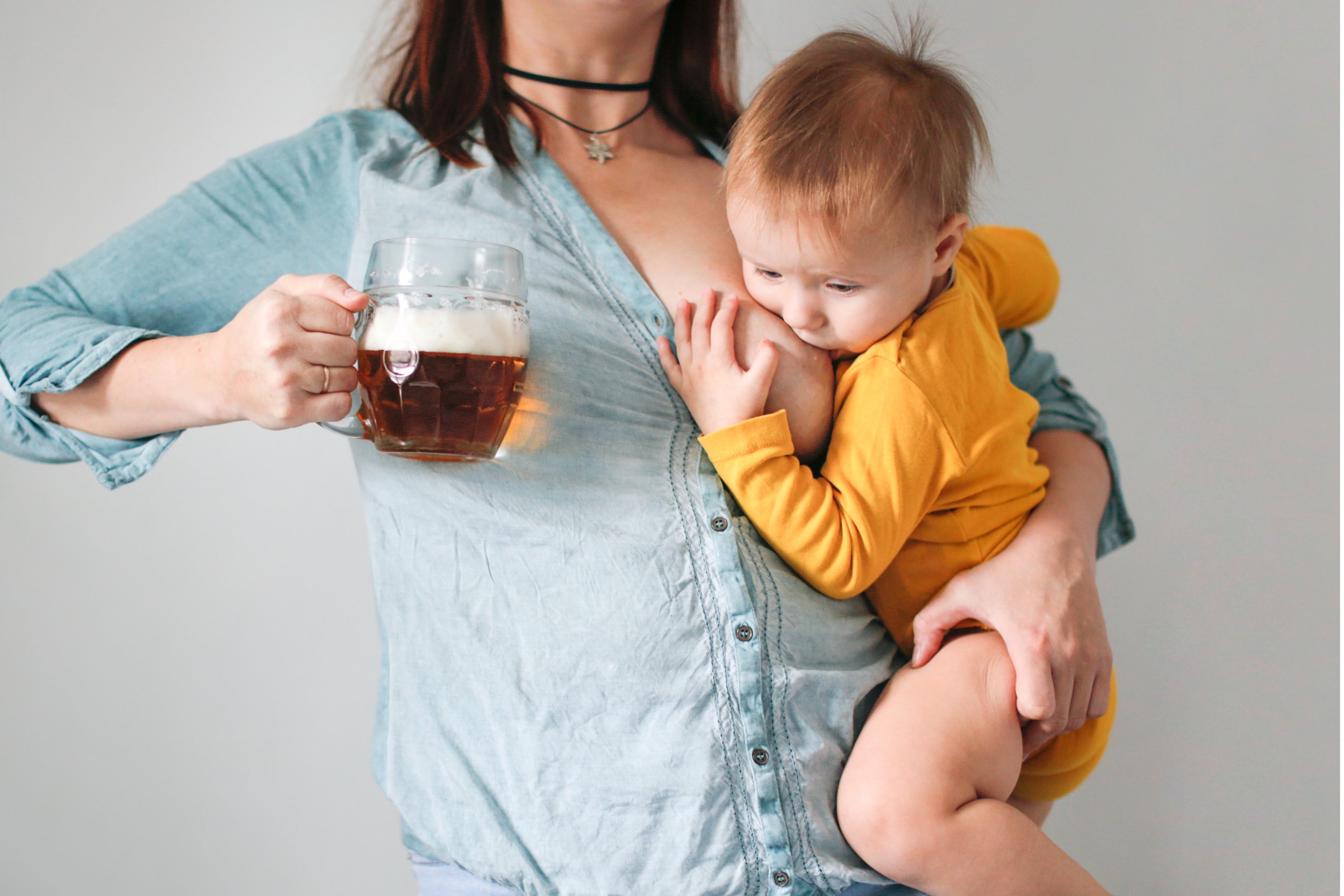Should Women Drink Alcohol When They’re Breastfeeding? 
Deciding whether to have a drink while breastfeeding can be a complex issue. You might be craving a glass of wine, or a social occasion might tempt you to indulge, but questions about safety likely linger. This article helps you navigate those decisions with science-backed information.
Alcohol & Breast Milk: What You Need to Know
Alcohol Transfer to Breast Milk:
- Direct Connection: When you consume alcohol, it enters your bloodstream and is distributed throughout your body, including your breast tissue.
- Similar Concentration: The alcohol concentration in your breast milk typically reflects the level in your blood, meaning as your blood alcohol content (BAC) rises, so does the amount in your milk.
- Factors Affecting Levels: Several factors can impact the amount of alcohol transferred into your milk:
- The amount consumed: The more alcohol you drink, the higher its concentration in your milk.
- Timing: Alcohol levels in breast milk typically peak around 30-60 minutes after consuming a drink and gradually decline over the following hours.
- Body composition: Smaller individuals or those with slower metabolisms take longer to process alcohol, leading to potentially higher levels in their milk for a longer duration.
- Eating: Eating slows down alcohol absorption into your bloodstream, potentially impacting the transfer to your milk.
Understanding How Long Alcohol Stays in Breast Milk:
While the previous section provided a basic understanding of alcohol’s stay in breast milk, let’s delve deeper with a more comprehensive exploration:
Factors Affecting Elimination Time:
Remember, several factors influence how long alcohol takes to clear your system and, consequently, how long it stays in your breast milk:
- Amount of Alcohol Consumed: The more alcohol you consume, the longer it takes for your body to eliminate it completely. Each standard drink requires approximately 2-3 hours for elimination.
- Body Composition: Individuals with lower body weight or slower metabolisms tend to eliminate alcohol slower, leading to potentially longer periods of alcohol presence in their breast milk.
- Eating: Food slows down alcohol absorption into your bloodstream, potentially delaying its peak concentration in your milk but not necessarily affecting the overall elimination time.
Estimating Elimination Time:
- General Rule: As mentioned earlier, a general rule of thumb suggests it takes about 2-3 hours to eliminate one standard drink of alcohol. This implies waiting at least 2-3 hours after consuming a single drink before breastfeeding to minimize alcohol transfer to your baby.
- Calculating Elimination Time: To estimate the time it takes for multiple drinks to clear your system:
- Multiply the number of standard drinks consumed by 2-3 hours.
- Example: If you have two drinks, it might take approximately 4-6 hours for your body to eliminate the alcohol completely.
Potential Risks of Alcohol & Breastfeeding: A Detailed Exploration
While some mothers choose to have an occasional drink while breastfeeding, it’s crucial to understand the potential risks associated with this practice. Let’s delve deeper into the potential consequences of alcohol consumption on breastfeeding babies:
1. Impact on Infant Sleep and Development:
- Disrupted Sleep Patterns: Alcohol can disrupt a baby’s sleep patterns, leading to drowsiness and difficulty staying asleep for longer stretches. This can be particularly concerning for newborns and younger infants who need adequate sleep for optimal development.
- Developmental Concerns: Studies suggest that even occasional or moderate alcohol consumption during breastfeeding might subtly affect a baby’s motor development.
2. Reduced Milk Production and Let-Down Reflex:
- Milk Supply: Excessive alcohol consumption can interfere with milk production, potentially leading to a decrease in the amount of milk available for your baby.
- Let-Down Reflex: Alcohol consumption can also hinder your let-down reflex, making it more difficult for your baby to latch and receive milk effectively.
3. Impaired Mother-Baby Interaction:
- Judgment and Coordination: Alcohol can impair your judgment and coordination, potentially affecting your ability to safely care for your baby and respond to their needs adequately.
- Bonding and Attachment: Excessive alcohol use can negatively impact the crucial bonding and attachment process between you and your baby.
4. Additional Concerns:
- Increased Risk of Accidents and Injuries: Impaired judgment and coordination due to alcohol consumption can increase the risk of accidents or injuries to both you and your baby.
- Long-Term Health Effects: While research is ongoing, some studies suggest potential long-term health concerns for babies exposed to alcohol through breast milk, such as increased risk of behavioral problems or developmental delays.
Tips for Limiting Risks
If you choose to drink while breastfeeding, these strategies can minimize potential risks:
- Timing is key: Try to drink right after breastfeeding, giving your body time to process the alcohol before the next feeding.
- Pump and dump: If you have more than one drink, consider pumping and discarding your milk for several hours afterward.
- Observe your baby: Be alert to any changes in your baby’s behavior, sleep patterns, or feeding habits.
Choosing Not to Drink: The Safest Option – A Comprehensive Exploration
While some mothers navigate the decision to have an occasional drink while breastfeeding, it’s crucial to emphasize the numerous benefits and advantages associated with choosing not to drink at all. Let’s delve deeper into why abstaining from alcohol is the safest option for breastfeeding mothers:
1. Unmatched Safety for Your Baby:
- Complete Elimination of Risks: Choosing not to drink eliminates any potential risks associated with alcohol exposure through breast milk. This ensures your baby receives completely alcohol-free milk, offering them the safest and healthiest nourishment possible.
- Peace of Mind: Abstinence provides immense peace of mind and eliminates any concerns or anxieties about potential negative impacts on your baby’s well-being, allowing you to focus on nurturing and bonding without worry.
2. Unwavering Support for Optimal Development:
- Uninterrupted Sleep Patterns: Avoiding alcohol ensures your baby receives breast milk free from any sleep-disrupting effects, enabling them to experience undisturbed sleep cycles vital for their growth and development.
- Optimal Brain Development: Choosing not to drink helps avoid any potential subtle or long-term effects on your baby’s cognitive development, fostering a healthy foundation for their learning and future success.
3. Maintaining Milk Production and Quality:
- Abundant Milk Supply: Abstaining from alcohol eliminates the risk of decreased milk production, ensuring your baby receives the full benefits of your breast milk’s abundant nutrients and immune-boosting factors.
- Uncompromised Milk Composition: Opting out of alcohol consumption safeguards the crucial composition of your breast milk, maintaining its optimal nutritional value and providing your baby with the essential building blocks for their growth and health.
4. Strengthening the Mother-Baby Bond:
- Clear Focus and Engagement: Choosing not to drink allows you to remain fully present and focused on your baby, fostering a strong and healthy attachment through clear communication and responsive care.
- Enhanced Emotional Connection: Avoiding alcohol promotes a deeper emotional connection with your baby as you interact, care for their needs, and nurture their development without any potential disruptions in your judgment or emotional state.
5. Prioritizing Overall Well-being:
- Healthy Lifestyle Example: Abstaining from alcohol sets a positive example for your baby, promoting awareness of healthy choices and fostering a foundation for healthy habits in the future.
- Personal Well-being: Choosing not to drink allows you to prioritize your own physical and mental health, ensuring you are in the best possible state to care for yourself and your baby effectively.
When to Call Your Doctor:
Don’t hesitate to contact your doctor or your baby’s pediatrician if:
- You’re concerned about your alcohol consumption and its impact on breastfeeding.
- You notice significant changes in your baby’s behavior or feeding patterns.
- You struggle to stop or reduce your alcohol intake and need additional support.
Remember: Your health and your baby’s well-being are top priorities. Open communication with your doctor can ensure you make informed decisions about breastfeeding and alcohol.

